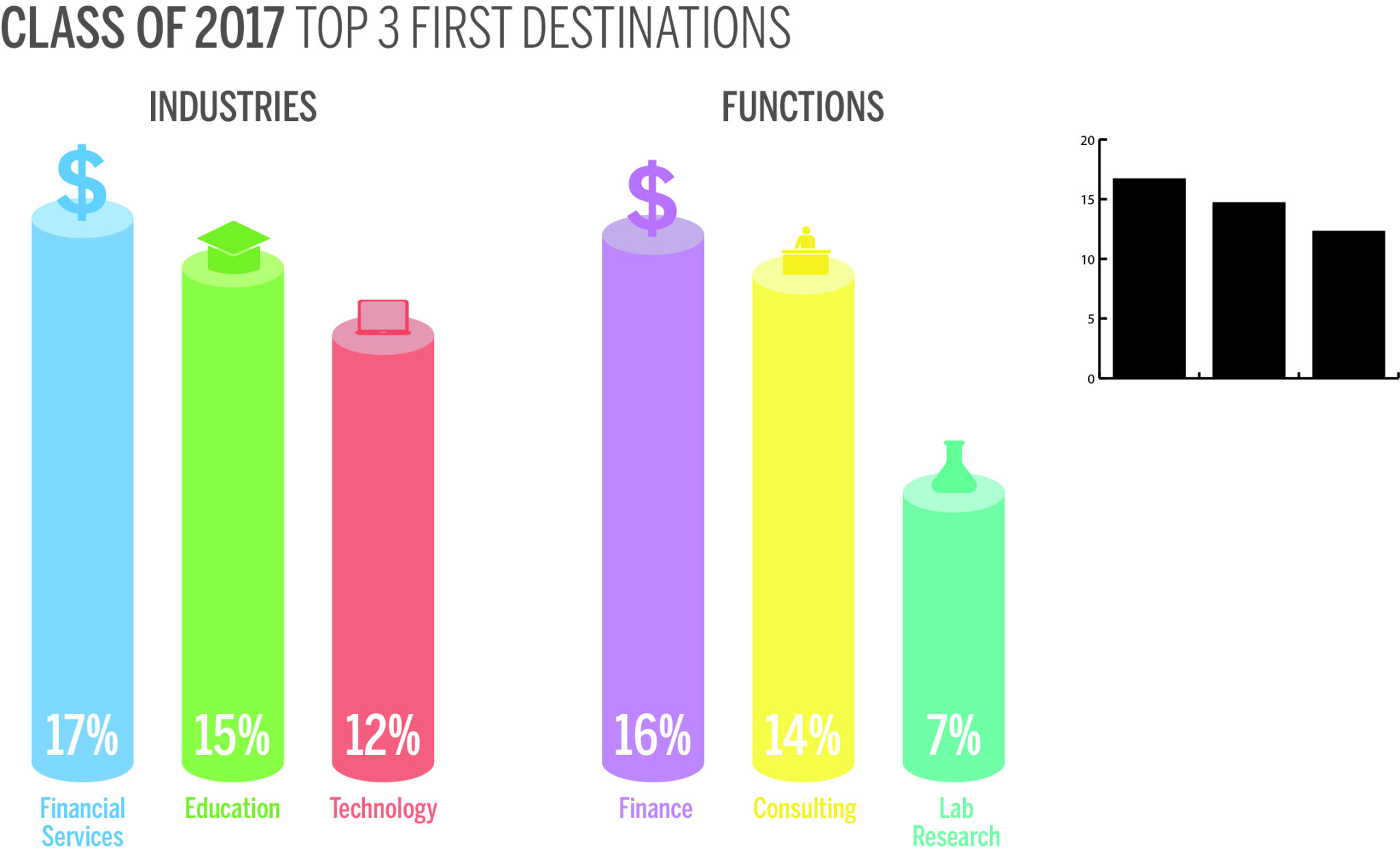
Courtesy of Office of Career Services
Yalies are entering technology-related fields after graduation in growing numbers, and fewer are heading straight to graduate school, according to preliminary data from the Office of Career Strategy’s First Destinations Survey of the class of 2017.
The survey, which will officially conclude in December and has been completed by more than three-quarters of the most recent graduating class, indicates that more than 12 percent of those working a job in the class of 2017 are doing so in the tech industry. This makes technology the third most popular industry among this cohort, and marks the first time the industry has broken into the top three most common fields among outgoing Yalies. Still, tech trails behind this year’s most popular first destination sector, financial services, as well as the second most common industry, education.
At the same time, fewer alumni are immediately pursuing graduate studies, with around 16 percent of respondents indicating plans to enroll in graduate school. This figure represents a decline from the 18 percent of the class of 2016 that attended graduate school upon graduation.
OCS Director Jeanine Dames said her office has been following these developments. In particular, Dames noted that health care, in addition to technology, has made significant gains over the last few years.
“We have been watching the steady increase in graduates pursuing the technology and healthcare industries, across multiple functional areas, for the past five years,” Dames said.
Indeed, this year health care accounted for more than 10 percent of the total job destinations for the first time in the survey’s history.
Because health care and technology are fast-growing industries, Dames said, there are more job openings in these fields. Dames also noted that OCS has been tracking the increasing student interest in these areas, and as a result, the office has built more employer relationships in corresponding fields.
From Dames’ point of view, however, Yalies seem particularly suited to these lines of work.
“[Technology and healthcare] are two industries that offer jobs that are cross-functional in nature which resonate with Yale students and the liberal arts education overall,” she said.
Jihad Womack ’17, who was a molecular, cellular and developmental biology major at Yale but now works in the entertainment industry, said he observed that tech companies were recruiting students in large numbers during his senior year. Noting that many tech companies also attract Yale applicants through summer internships that eventually lead to job offers, Womack said many tech jobs have lucrative salaries, good benefits and enticing perks — attractive features, he thought, for young adults fresh out of college.
Still, while he could see the appeal of tech jobs, Philip Wilkinson ’17 pointed out that, for a history and global studies double major like himself, there are few entry-level jobs available, making graduate school an attractive option. Wilkinson said he will be pursuing an master’s in American history at Cambridge this academic year, a program of study he dreamed about for his entire senior year.
Wilkinson, however, is part of a diminishing group of Yale graduates who immediately pursue graduate degrees.
“There has been a national trend of recent graduates waiting a few years to attend graduate school,” Dames said.
She added, however, that OCS asks students not immediately attending graduate school if they intend to do so within the next five years, and, according to Dames, usually more than 75 percent say “yes.”
The first destination survey also monitors the function, or specific role, that recent graduates fill in their respective industries.
The most popular function for the class of 2017 was finance, and consulting was the second most common function, accounting for 14.3 percent of the share of job types. In third place, at 7.3 percent, was laboratory research.
Viewed through any lens, however, the future plans of recent graduates interviewed by the News had direct connections to their Yale educations. Womack said that taking a large number of science courses and doing research at the medical school was a valuable experience because he realized he was not interested in laboratory life. He decided in the summer before his senior year that he instead wanted to work in entertainment.
“I attended an entry level Hollywood workshop hosted by the Common Good and Creative Careers department in the Office of Career Strategy, which talked about working in a mailroom at a top talent agency,” Womack said. “I was hooked.”
And according to Wilkinson, everything he did every year at Yale informed his next step.
“I definitely came to understand my Yale education as an investment that will pay large dividends over time,” he said. “We must be patient and steadfast in the pursuit of our goals to see this manifest itself. I’ve spoken with enough alums of all ages to know, however, that it will come to pass.”
Luke Ciancarelli | luke.ciancarelli@yale.edu | @lvc250







